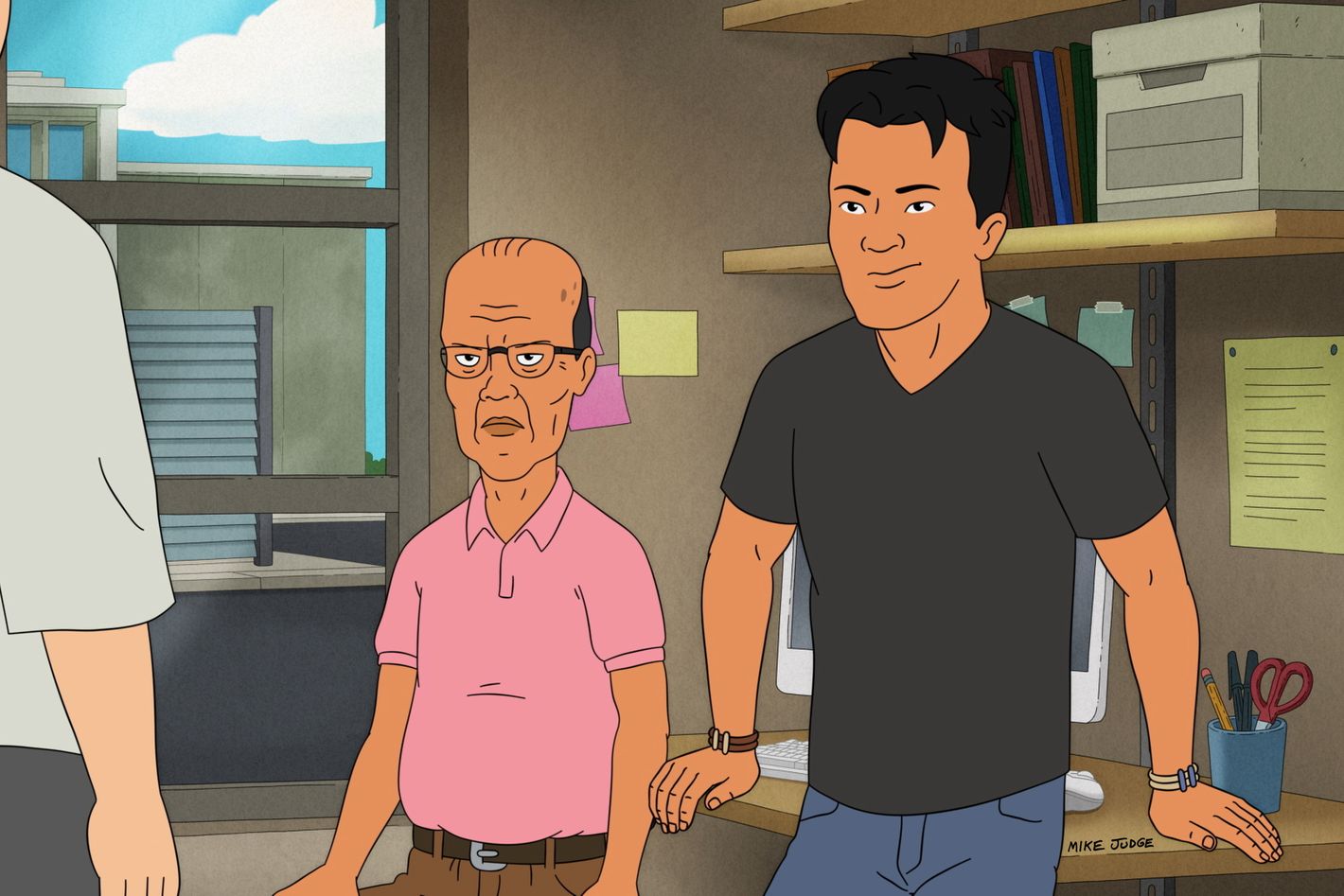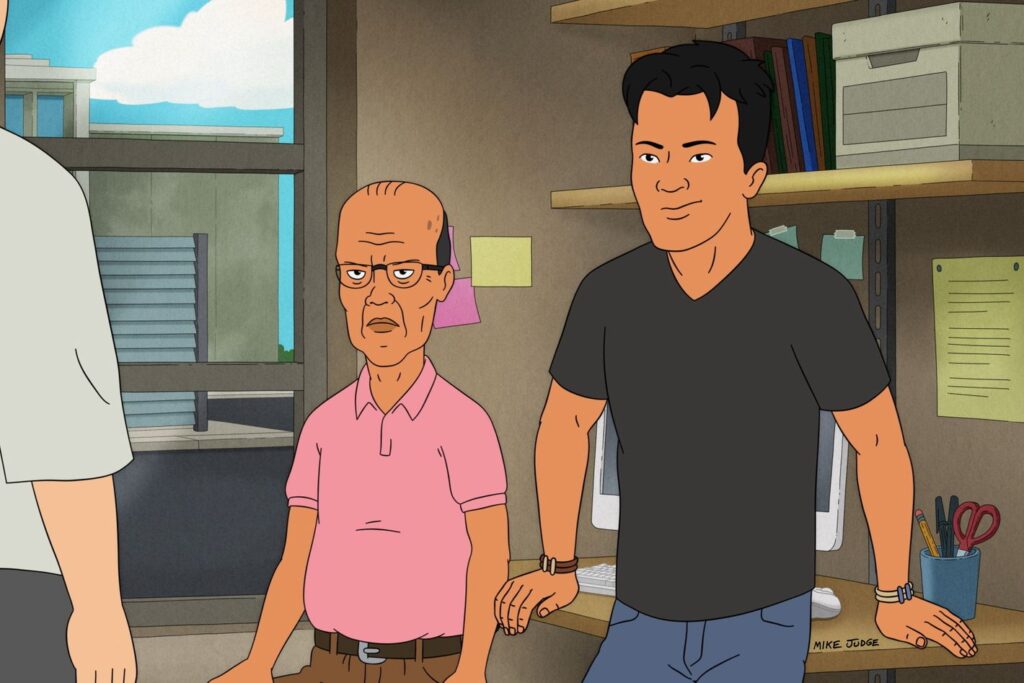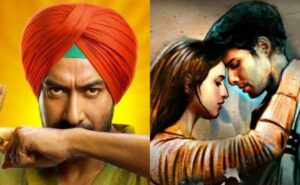
Of all the various character relationships King of the Hill developed over its first 13 seasons, the one between Hank and Bobby is the most interesting to return to post-time jump. The friction between stoic father and sensitive son was built into the show’s premise from the start — see: “That boy ain’t right” — and the series returned to that sensibility gap regularly over its initial run. But as long as Bobby remained a minor living under Hank’s roof, there was always going to be a ceiling on how much their relationship could grow. Now that Bobby is independent and carving out a life on his own terms, it opens up a whole new angle from which to examine his and Hank’s dynamic. This is some of the revival’s strongest stuff, which I suspect the show realized and consequently front-loaded this season’s Hank-Bobby episodes; there’s another good one coming down the pike, plus a nice Peggy-Bobby iteration, but from here on out, father and son are on more separate tracks.
In that respect, “Bobby Gets Grilled” feels kind of like the conclusion of a three-episode arc that began with the premiere. This isn’t to say nu-King of the Hill has become more serialized; each of the first three episodes still stands on its own. But taken together they form a neat little Hank-Bobby re-introductory triptych: The premiere kept them apart in order to build to their reunion in its final scene; “The Beer Story” used a shared storyline to put them in direct competition; and now “Bobby Gets Grilled” gives each his own distinct storyline in a split narrative that comes back together with Hank acknowledging Bobby as the man he’s become, a sweet bit of narrative fusion that goes together like sauerkraut and ice cream.
I am admittedly taking King of the Hill’s word on that actually being a good combo. While we get a better sense of Robata Chane’s menu in this episode, it still feels a little like the Japanese-German fusion idea is less about what sounds tasty and more about what sounds funny. However, it also provides the narrative basis for Bobby’s half of this episode, as his approach to “authentic” fusion cuisine comes in for accusations of cultural appropriation from both sides of the menu.
This is potentially dicey territory that “Bobby Gets Grilled” is able to navigate deftly thanks to some smart character additions to Bobby’s professional circle. If it seemed odd that Bobby would align with the Wassanasongs for his restaurant venture, this episode provides the payoff to that choice. As Bobby’s business partner, Chane’s non-Japanese Asian heritage adds some nuance to the authenticity conflict with Yoshido, who refuses to become Robata Chane’s new supplier of binchōtan charcoal, as well as some good Chane-is-dumb jokes. (“If there was a Laotian martial art, I’d use it to kick your ass!” “There is… it’s called muay lao.”) Ted’s primary identity of “businessman,” meanwhile, pushes against the authenticity argument from the opposite direction; where Yoshida considers it a non-negotiable, Ted’s only non-negotiable is that Robata Chane remain open so that his son doesn’t go back to DJing. (“Bobby, I’d love to serve authentic Laotian cuisine, if anybody ever heard of it … but you know what everybody’s heard of? Propane. And nobody’s going to realize you’re using it.”)
Then there’s Bobby’s sous chef Emilio, who brings Latino representation, sure, but what he really contributes to this episode’s exploration of authenticity has less to do with his cultural heritage than his background working in restaurants. (Though I must applaud his assessment of Mel Blanc, voice of Speedy Gonzalez, Bugs Bunny, and Porky Pig as “a white guy who stole a lot of jobs from Latinos and farm animals.”) The pep talk Emilio gives Bobby near the episode’s end is a timely acknowledgement that immigrants, Latino ones especially, are the industry’s lifeblood, and also a great example of King of the Hill’s ability to distill a politically charged storyline into a poignant character moment. Bobby may not be Japanese or German, but his love of food and cooking is authentically him — he’s been interested in culinary fusion since he was dipping fruit pies in tuna fish — and it’s made him a great chef.
Hank’s route to the episode’s final word on the matter is a little more circuitous, originating in his disappointment that Bobby prioritized commitment to authentic, charcoal-grilled robata over what Hank sees as his own cultural heritage. “Why can’t he make a restaurant where he cooks on a backyard propane grill just like everyone else in Texas?” Hank wonders to Peggy as they leave Robata Chane. This line not only tees up the obligatory “That man ain’t right” gag, it’s a neat segue into their visit to the George W. Bush Presidential Library, with an along-for-the-ride Nancy (whom Hank deems “a good hang”) and Dale (who’s there because if Peggy invited just Nancy, people would think Hank had two beautiful wives). There, they are exposed to authentic historical artifacts like the pen that lifted the ban on offshore drilling and the leather work gloves used to help clear invasive cedar from Bush’s ranch. Hank is enthralled by such mundane representations of his own personal Texas idyll, but the rest of the tour group has no such appreciation for this version of history, making them susceptible to Dale’s much more entertaining version.
This turns into another great example of King of the Hill’s character-forward approach to politically charged material. Hank’s insistence that his friend’s conspiratorial ravings are for “entertainment purposes only” sets up the revival to acknowledge that Dale’s core comedic trait hits different in the era of election denial and Q-Anon. (“We get at least one a day,” sighs tour guide Jack McBrayer when Hank apologizes for his friend.) While Hank was out of the country, Dale became “a trusted source, a sober greybeard, the voice of common sense.” Who cares about Laura Bush’s inaugural gown when Dale has his own “fun facts” about Bush’s secret twin brother Jub (Secret Service codename: Jubya)? Who wants to reenact the 2008 collapse of the subprime mortgage industry when they could hear about how Fannie Mae and Freddie Mac were actually the same person? Dale’s version of “the truth” is just ridiculous enough to still register as comedy, but its satirical bite comes from the way his Newsmax-loving audience embraces it so enthusiastically, and at the expense of being able to recognize when history is repeating itself. (Hank gets a shoe thrown at him twice, both by the same guy, who is last heard from angrily wondering why he has no shoes.)
That satirical bite is arguably dulled a bit by the rushed way “Bobby Gets Grilled” extracts Hank and co. from this mess — they’re late for dinner at the restaurant, so they just leave, right as things are reaching a shoe-throwing pitch — but I’ll give it a pass since we’re still working with 25-minute runtimes here. (And hey, kudos to KOTH for not succumbing to streaming runtime bloat.) Besides, this is a Hank-Bobby episode, remember, and we have a Moment of Understanding to get to, so off to Robota Chane’s “last supper” we go.
In “The Beer Story,” this moment was a meeting in the middle, with Bobby and Hank both recognizing how they let their pride get in the way of their relationship. But here it’s more of a one-way street, with Hank learning how to meet his son where he’s at. The moment when we watch Hank register that Bobby is not just capably manning a grill but also overseeing a whole kitchen staff, all while standing up to a bunch of whiny gibletheads who are trying to keep him from doing the thing he loves — ah, that’s the good stuff. His grill-side apology to his son is this episode’s umami moment, adding depth and richness to all the other story elements: “Bobby, recent events have made me realize why you value historical accuracy and authenticity. When I was at the Bush Library, I realized just how hard it was to get a consensus. And, well, the consensus here is that everyone loves the food. And that includes me.” This kind of character growth, both Bobby and Hank’s, is deserving of the toast that closes the episode, so prost and kanpai to Bobby Hill, and to King of the Hill for such a thoughtful yet funny fusion of past and present.
Musings
• Backstory Corner: Bobby opted for a charcoal grill in his restaurant because it’s more authentic, sure, but let’s not forget his illicit love affair with the dirty fuel goes all the way back to season five’s “Hank and the Great Glass Elevator,” wherein he and Peggy get addicted to charcoal grilling while Hank is out of town. It ends with them agreeing to pretend they prefer propane for Hank’s sake, but Adult Bobby isn’t going to pretend anymore.
• Speaking of backstory: After this episode, I’m dying to know more about Bobby’s path from aspiring prop comic to executive chef. When and how was he exposed to authentic robata? Did he do time in other kitchens before this? There’s potential for a whole spinoff series here! Proposed title: Yep, Chef.
• I like that an episode with a thematic interest in history and tradition not only brings back a couple of classic catchphrases — with Dale firing off a “Wingo!” in addition to Hank’s aforementioned boy-ain’t-right — it also works in a nod to the “fiddy men” Cotton killed, via one of Bobby’s German-American tormenters, who thinks it would be better if Bobby were “racially pure.” (“Really? You’re going there?” replies Bobby, perfectly.)
• Another great observation from Emilio, who considers Speedy a hero because he fought the good fight against American imperialism (a.k.a. Sylvester the Cat). And the button Bobby puts on the Mel Blanc gag, a pitch-perfect “sufferin’ succotash,” is a nice way to put a little shine back on the name of a voice-acting legend.
• The whole Mel Blanc convo is set in motion by Joseph, who bemoans not being able to dress up like Speedy for Halloween because he’s “a white dude,” so I guess that’s confirmation that Joseph remains in the dark about his own authentic cultural heritage.
• Shoe-throwing guy: “Can I be Epstein?” Hank: “From Welcome Back Kotter? No. Why?”
• If sauerkraut ice cream does in fact sound appetizing to you — I admit I’m curious! — note that the Pennsylvania-based Urban Churn does an annual limited release around New Year’s.
KOTH’s approach to politically charged material gets an update for our conspiratorially obsessed times































































